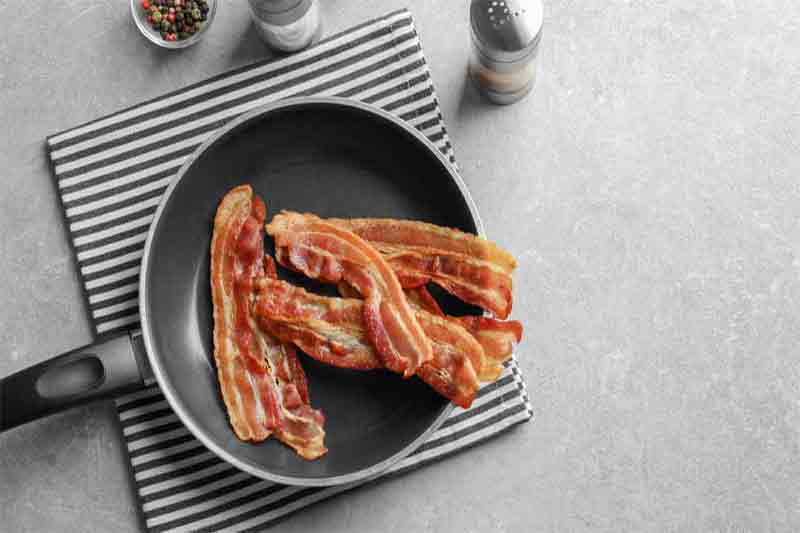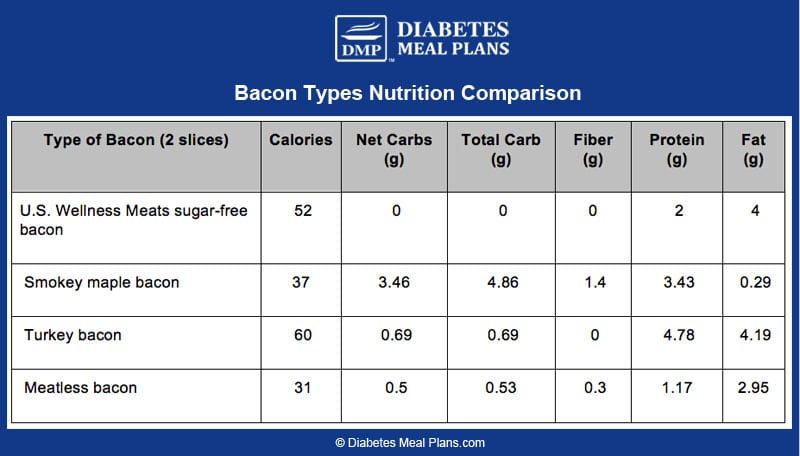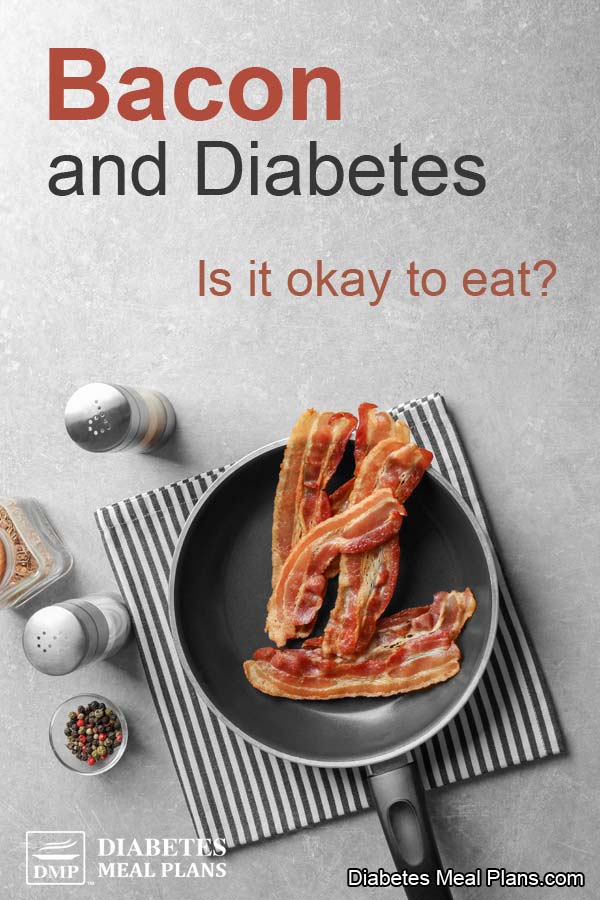Table of Contents[Hide][Show]
Bacon is obviously a well-loved food. And in low carb circles, bacon is eaten for breakfast, lunch and dinner on a regular basis.
But… do bacon and diabetes make a good match?
Let’s answer that question now.

Bacon Nutrition Facts
Bacon is simply a cut of pork that has been cured with brine and spices, so on first impressions, it seems like bacon would be naturally lower in carbs. And it certainly is.
2 slices of bacon yield zero carbs, 7 grams of fat and 5 grams of protein.
Looking at the nutrition facts alone, bacon seems like a great addition to a low carb diet since fats and proteins are satisfying and help stabilize your blood sugar. That’s why you’ll see “I love bacon!” promoted on nearly every low carb website out there!
Unfortunately though, there is a catch that makes things a little more complicated.
Most commercial bacon is highly processed and tainted with sugars, preservatives, and fake flavorings in order to make it more appealing.
Here are the common ingredients that you might find in a package of conventional bacon:
- Bacon (Cured with Water, Salt, Sodium Erythorbate, Sodium Nitrite, May Also Contain Smoke Flavoring, Sugar, Dextrose, Brown Sugar, Sodium Phosphate, Potassium Chloride, Flavoring).
Thankfully there are some brands of bacon that are minimally processed and totally sugar-free (although they are few and far between) so do your research and only go for the cleanest meat products you can find.
An example of an excellent brand is U.S. Wellness meats, whose sugar-free pork bacon contains only pork, sea salt, and some natural smoke flavor. Now that’s eating clean!
Bacon Options Compared
There are so many different food options these days that it can make your head spin.
Standing in the meat isle you might see regular bacon, maple bacon, turkey bacon, and even meatless bacon! How can you tell which selection will provide the best nutrition?
Looking at the ingredients list and the nutrition facts on the back of any food is the best place to start.
Ask yourself a few questions:
- Does this item have dozens of unfamiliar ingredients? Or are there only a few? Typically, a longer ingredients list indicates that a food is more heavily processed.
- Next, examine the nutrition facts label, check out the number of carbs it contains, and look for any added sugars.
You can see a major difference between the amount of carbs in the U.S. Wellness sugar-free bacon and the smoky maple bacon on the chart below.

The U.S. Wellness bacon contains zero carbs because it hasn’t been doused in sugar during the curing process, but the smoky maple bacon has close to 5 grams of total carbs per serving (two slices).
As a general rule, any meat that is advertised as “brown sugar,” “honey,” or “maple” flavored tends to be more carb-heavy, but the only way to know for sure is to simply check the nutrition facts.
On another note, meatless bacon may sound like a healthier option, but it really isn’t.
Imitation meats are about as far from a “whole food” as you can get, as they often are full of dyes, artificial flavors, sweeteners, and preservatives.
The popular vegetarian brand Morning Star sells a faux-bacon product that contains over 30 different ingredients!
Turkey bacon is another controversial topic in the world of nutrition, and many health experts have strong opinions about it one way or another.
The main appeal of turkey bacon is that it is lower in fat than traditional pork bacon.
The examples in the chart above show that the turkey bacon actually contains a little more fat (0.19 g more) than the sugar-free pork bacon does, so this is clearly not a hard and fast rule.
But even if it was, it’s important to realize that dietary fat is not the enemy – fat is actually a healthy nutrient!
Just keep in mind: turkey bacon is in no way superior to pork bacon. In fact, most turkey bacon is overly processed in an attempt to imitate the flavor and texture of pork bacon.
When it comes to bacon it is best to choose a clean, minimally-processed, sugar-free cut.
Please pin, tweet or share; then keep reading – thanks!

Research on Bacon and Type 2 Diabetes
While bacon is not off limits, there’s a reason processed meat is not promoted as a healthy food and that’s because it’s not as healthy as eating fresh cuts of meat.
According to a 2013 cohort study of over 16,000 European adults, there was a significant positive association between the consumption of meat, particularly processed meat, and the development of type 2 diabetes.
A 2010 review found that the intake of unprocessed red meat was not associated with an increased risk for either diabetes or coronary heart disease, whereas the intake of processed red meat was associated with a 42% increased risk of coronary heart disease and a 19% increased risk of developing diabetes.
It is also fairly widely accepted that processed meat is associated with both heart disease and colon cancer.
So Is Bacon Off-Limits?
No, bacon is not off limits completely.
Meats, even processed meats are a high protein, low carb food so they won’t influence blood sugar and A1c levels, which is great news for you. However, processed meats like bacon shouldn’t make up the majority of your meals. For the most part, non processed meats, poultry and fish should make up the predominant proteins in your diet.
That said, the occasional bacon breakfast or the addition of bacon to a meal here and there, can add to the flavor and enjoyability of your diabetic diet.
And wherever you can, seek out brands that are less processed and naturally sugar free.
Please pin, tweet or share this info with others – thanks!


Al Plunkett
I have type 2 and on Tresiba insulin. The past week nothing is helping. I have gone from about a 7 sugar to as high as 20 and it is staying around 17 night and day . I am eating a good diet , but sugar stays high
Dr Jedha - Nutritionist (PhD)
Hi Al, Tresiba is a long-acting insulin that helps manage blood sugar levels in diabetes. If you’re experiencing elevated blood sugar levels despite using it, then you might consider several factors: the dosage of insulin, the timing of insulin administration, physical activity levels, stress, illness, or even slight changes in your diet could play a role in high blood sugar levels. You may also need to review your diet guidelines to see if you are in fact eating too many carbs, for example.
Karen Long
I have never heard of sugar-free bacon. Have not seen in regular grocery store, so should we look at health food stores or stores like Trader Joes?
Emily - Dietitian (MS, RD)
Not necessarily, Karen. The package of bacon won’t read ‘sugar-free bacon.’ Check the ingredient list and look for one without any sugar added- as mentioned in the article one of our favorites is US Wellness Meats which contains only pork, salt, and natural flavors.
In general if the label advertises “brown sugar,” “honey,” or “maple” flavored, then those ones probably have more sugar added to them. But the best way to know is to check the ingredient list and look at the nutrition label. You should be able to find an acceptable choice in most grocery stores!
Roger Gunderson
Hi! I have type 2 diabetes, and a nutritionist told me that eating bacon in the morning will help blood sugar spikes; she explained that the fats in bacon create a sort arc or a rounding out of the spike.
Do you agree? What theory is she referring to ?
She advised me to add peanut butter ir bacon or other fats to morning meals to round out sugar spikes crested by carbs.
Can you explain this theory further?
Thanks,
Roger in Laguna , CA
Dr Jedha - Nutritionist (PhD)
Hi Roger, it’s all about how the body processes nutrients so combining fats and protein with carbohydrates can help to slow down the absorption of glucose into the bloodstream. But you still need to be aware of how many carbs you eat overall, as it’s not going to prevent high blood glucose if you eat 70 grams of carbs at one meal. You might also want to keep bacon as a ‘sometimes’ food. There are lots of different types of protein and fat-based foods. See our recommended food list here.
Renee
Good morning Jedha,
I have diabetes and hbp and I was wondering which eggs are best for me to eat, or no eggs?
Emily - Dietitian (MS, RD)
Any eggs are perfectly fine to include in your diet! Your choice if you want to opt for something special like cage free or organic, but that isn’t necessary. Check out this article for more information!
April
Having prediabetes is a bit of a wake up call,but knowing this can be reversed has now become a required loyal mission of mine. I’m so looking forward to your input & knowledge sharing.
Being from Canada our blood glucose monitors are not the same. Will you share readings from both ?
Emily - Dietitian (MS, RD)
Yes! We almost always report blood sugar values in both mg/dL and mmol/L. For example, check out this article about healthy blood sugar ranges! Good luck on your journey, always feel free to reach out to us as questions arise.